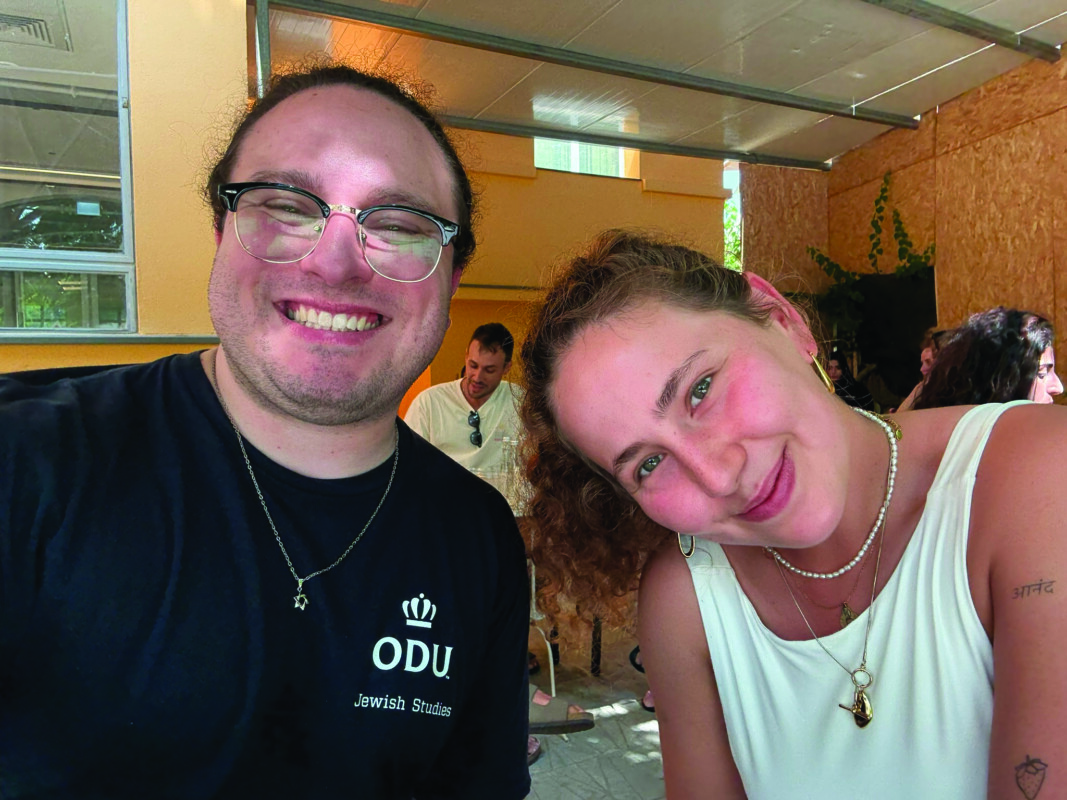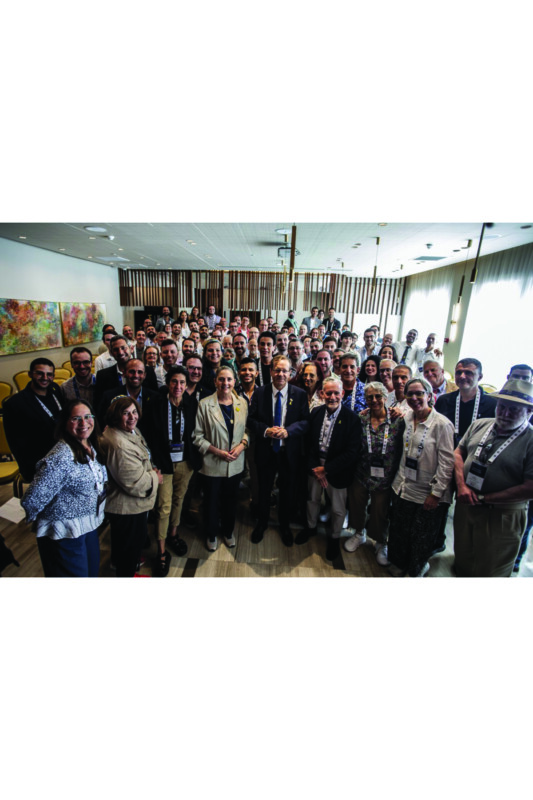This past June, I participated in the Jewish Federation of North America’s 2025 LGBTQ+ Pride Month mission to Israel, the first trip of its kind in nearly a decade. I joined nearly 100 LGBTQ+ Jewish leaders representing 26 Jewish Federations from across North America. It was a tense time to go, but it was more impactful than nearly anything I have ever done in my life.
Navigating the world as a Jewish gay individual means carrying two complex identities, each with its own set of joys and hardships. Many of my fellow participants shared stories of how their support for Israel, or simply their connection to Jewish heritage, had been weaponized, resulting in ostracization within their local LGBTQ+ circles. The simplistic narrative that advocacy for a Jewish state and for Palestinian human rights are mutually exclusive misses the nuance so necessary for understanding. For many, the mission to Israel was an act of reclaiming space at this intersection.
In the taxi from the airport to my hotel in Tel Aviv, I realized that while I visited Israel in 2023, before October 7, the country felt both familiar and wholly different. This time, yellow ribbons adorned flagpoles and images of hostages appeared on buildings, bus stops, light poles, and storefronts, yet daily life continued.
On a trip to the south to visit the areas most impacted by the attacks on October 7, our guide taught us the Hebrew word for resilience, chosen. This word ended up being one of the major themes of the trip.
When I met former Tidewater ShinShin Alma Ben Chorin for coffee, she shared her post-October 7 experience in the IDF working with Lone Soldiers, brave individuals who moved to Israel to join the IDF with no family connections in the country. She spoke of their bravery and the spike in volunteers making aliyah following the attacks.
At Kibbutz Nir Oz, a mile-and-a-half from the Gaza border, residents have always lived under the threat of missiles. While the completion of Israel’s Iron Dome decreased the threat, residents still have less time to get to bomb shelters than it takes to tie a shoe. Many of these residents, despite this constant threat and serving as an example of Israeli resilience, strived for peace. They fought to end discrimination and drove sick Gazan children to Israeli hospitals for cancer treatments. On October 7, 2023, 380 Nir Oz residents were home. More than 40 were killed, and 76 were forcefully dragged into captivity in Gaza.
We visited Oded and Yocheved Lifshitz’s cactus garden, where I cried as we learned about their peace activism. Yochaved was taken hostage without her husband and feared he was dead. They were reunited briefly in Gaza before Yochaved was released, later hearing that Oded was killed in captivity a year later.
“Don’t cry, it’s going to be okay,” the Nir Oz survivor and guide told me. “The community is still striving for peace, and it will come.”
Later, I met Oded and Yocheved’s grandson at the Hostages and Missing Families Forum, as well as Gili Roman, whose sister Yarden was taken hostage. Roman shared the painful experience of being ostracized from an international gay sports group for publicly advocating for his sister’s release.
Following Nir Oz, we visited the site of the Nova music festival, where 364 people were killed, and 40 kidnapped to Gaza. Given the trip’s theme, I could not help but find a connection to the 2016 Pulse Nightclub massacre in Orlando. Young people dancing, taken from their loved ones in acts of radical terror. But I was reminded of chosen as I walked through the streets of Tel Aviv later that night, as people danced and hugged and laughed outside of bars and restaurants.
The next morning, we received a briefing from JFNA staff. Of the $1.2 billion raised annually by 146 Jewish federations across the US and Canada, 20-25% supports Israel and overseas needs. Since Oct. 7, JFNA has coordinated $225 million in emergency aid on top of what local federations raised. These funds helped launch trauma centers, distribute care packages, support mental health, aid small businesses, and provide resources for vulnerable groups, including LGBTQ+ Israelis.
Various Israeli organizations provide those resources. Ogen LGBTQ+ Life Center is transforming queer healthcare by connecting LGBTQ+ religious Jews and Muslims to affirming doctors through an innovative app, expanding access to medication, building supportive community, and more. “There are no politics in health,” their CEO said.
We heard from staff at the Agudah, a historic hub for Israel’s queer community, which was controversially ousted last year by an international gay rights group. Chavruta works with queer religious Jews, supporting gay men in heterosexual marriages and fighting conversion therapy, while Bat Kol provides support for religious lesbians. The Jerusalem Open House continues to advocate for LGBTQ+ rights in one of the world’s holiest cities.
Israel has made meaningful progress in LGBTQ+ rights, much of it through Supreme Court rulings, but these gains remain fragile amid ongoing judicial reform debates. While the state recognizes gay marriages that take place outside of Israel, there is not an option for civil marriage in Israel. LGBTQ+ youth face widespread discrimination: 92% report exposure to slurs, and one in three experiences harassment.
Since 2024, there have been 22 reported violent incidents linked to a popular queer dating app. These challenges have only intensified since October 7, raising urgent questions around military service for queer families, the recognition of same-sex partnerships in cases of loss, and a troubling 50% spike in substance abuse within the LGBTQ+ community.
We were reminded, though, that so many Israelis support LGBTQ+ rights and the queer community. At a meeting with President Isaac Herzog and First Lady Michal Herzog, who had recently made history by attending Jerusalem’s Pride parade, President Herzog said, “Acceptance and equality are central to the DNA of Israeli society.”
At dinner one night, a Houthi missile was intercepted over Tel Aviv. Taking cover in a bomb shelter, the Israelis among us chatted as if nothing was wrong. I was reminded again of chosen. But that was forgotten by our last day. That evening, as the mission ended, we danced: for those taken at Nova; for those who danced at Pulse; for those who perished in the Holocaust; for queer people lost to violence and bigotry; for all who can’t dance anymore.
Only about a dozen of us left Israel that night. Most of the nearly 100 mission participants planned to attend Tel Aviv Pride the following day. My flight departed a little after 1 am local time. By 3 am, sirens were blaring across Israel, and my fellow mission participants were scrambling to shelters as I flew over the Atlantic on one of the last planes out of Ben Gurion International Airport, following Israel’s attacks on Iran. It was only because I was returning home to celebrate my adult b’nei mitzvah at Ohef Sholom Temple that I left when I did.
JFNA immediately acted, helping the participants and keeping everyone together and accounted for. They arranged travel through Jordan, and then Egypt, to get everyone home. For some mission members whose passports and outward gender identity were at odds, they coordinated with Birthright, securing passage through Cyprus.
We went to Israel to celebrate pride in a community that understood, loved, and accepted us as Jewish Zionists. We left with a keen understanding of the chosen, the resilience of the Israeli people. The work that Jewish Federations do to support the Jewish homeland is essential in building that resilience.
Hunter Thomas is director of Arts + Ideas at United Jewish Federation of Tidewater. He can be reached at 757-965-6137 or HThomas@UJFT.org. To contribute to UJFT’s annual campaign, visit www.JewishVA.org/Campaign. For more information on the campaign, or how to can get involved, contact Amy Zelenka, chief development officer, at AZelenka@UJFT.org or 757-965-6139.



